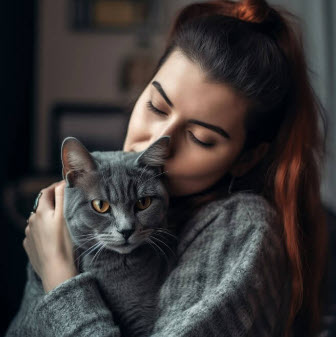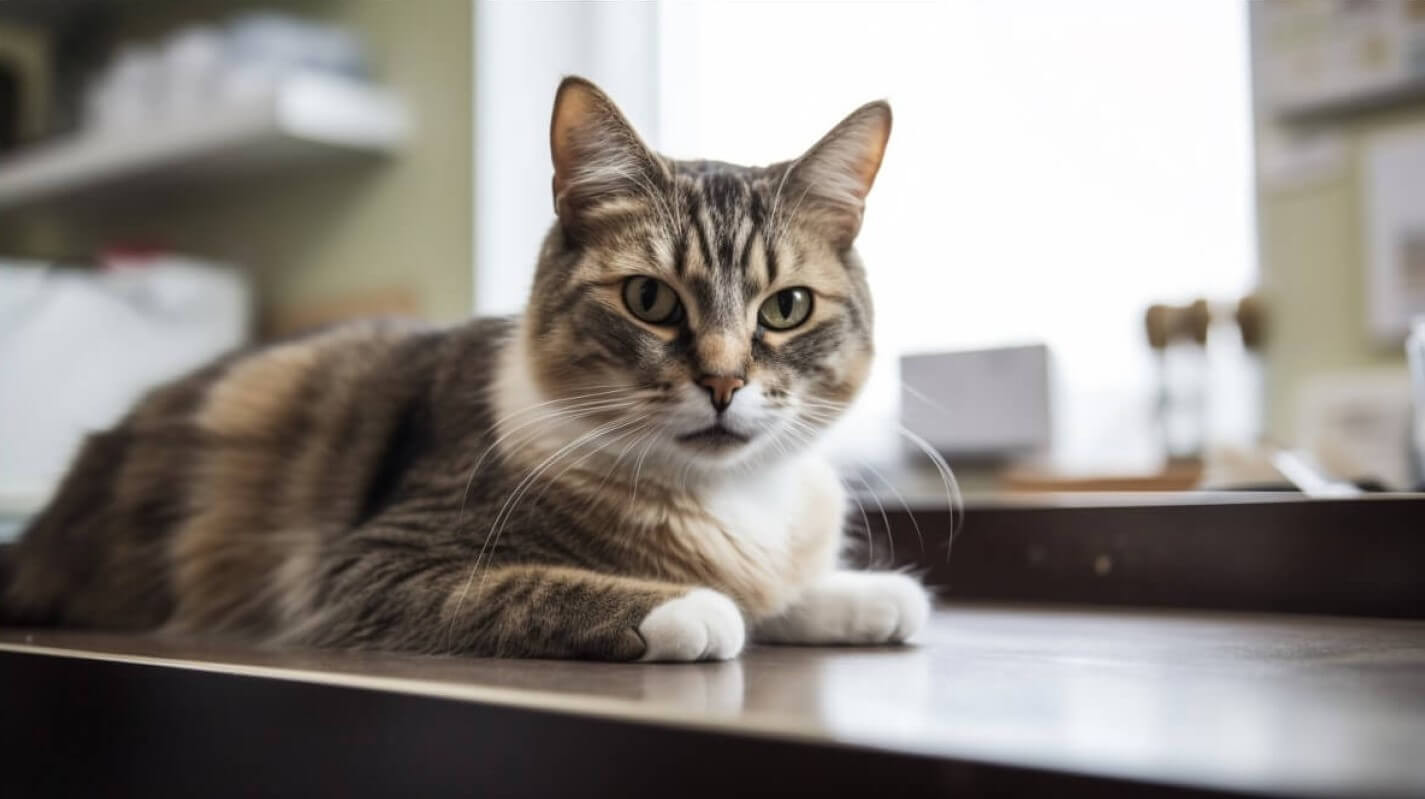Would you prefer to listen to a short podcast discussion about this article? Click on the audio below.
Table of Contents
As cat owners, we all want our feline friends to be healthy and happy. However, even with the best care and attention, cats can still become succumb to illness or develop diseases. It's important to be aware of the signs that your cat may be unwell, so you can seek veterinary care as soon as possible.
This article will discuss some common signs of illness in cats and some of the most common illnesses and diseases that can affect them. We will also provide tips on how to prevent these illnesses and when to seek veterinary care for your cat.
Changes in your cat's appetite and weight
Observing your cat's eating habits is crucial in monitoring their health. A decrease in appetite could indicate underlying health issues, and visiting a vet as soon as possible is essential. Illnesses such as dental issues, digestive tract complications, and even cancer could cause your cat to lose interest in food. Alternatively, an increased appetite could indicate an overactive thyroid, leading to weight loss or diabetes, leading to weight gain. It's crucial to closely monitor your cat's weight and investigate any sudden changes, whether they are gaining or losing weight.
Decreased appetite
If your cat refuses to eat for more than a day, it's time to schedule a vet appointment. In some cases, a decrease in appetite may indicate a feline upper respiratory infection, which can cause your cat to lose their sense of smell and, in turn, their appetite. Other reasons may include bad teeth, liver disease, or kidney failure.
Increased appetite
An increase in appetite could indicate an overactive thyroid or diabetes, leading to weight gain. It's essential to monitor your cat's eating habits and consult a vet if you notice any sudden changes.
Unexplained weight loss
Weight loss could signify an underlying health issue such as diabetes, cancer, hyperthyroidism, or kidney disease. It's crucial to visit a vet to identify the root cause.
Unexplained weight gain
Unexplained weight gain in cats could mean diabetes, thyroid issues, or excessive eating, leading to obesity. Monitoring your cat's weight and investigating any sudden changes in its habits is essential.

Abnormalities in your cat's litter box behaviour
Your cat's litter box also provides vital signs to monitor your cat's health. Here are some abnormalities in your cat's litter box behaviour that could indicate underlying health issues.
Excessive urination
Excessive urination could indicate a urinary tract infection or bladder stones. It's essential to monitor your cat's litter box to identify any changes in its urinating habits. If you notice excessive urination, it's best to visit a vet.
Excessive defecation
If your cat is defecating more than usual, it could indicate digestive issues, such as inflammatory bowel disease or parasites, such as worms. Visiting a vet could help identify the root cause.
Straining to urinate or defecate
Straining to urinate or defecate could indicate urinary obstruction or constipation. In both cases, taking your cat to the vet is essential as soon as possible.
Blood in urine or stool
Blood in urine or stool could indicate a variety of health conditions, including urinary tract infections, bladder inflammation, or even cancer. If you notice any bleeding in your cat's litter box, please visit your vet.
Unusual physical symptoms in your cat
Here are some unusual physical symptoms in your cat that might indicate underlying health issues.
Vomiting
Vomiting is common in cats, but if it's happening frequently, it could be a symptom of a severe health issue. It could indicate kidney failure, pancreatitis, or even cancer.
Diarrhea
Diarrhoea could be a sign of food allergies, parasitic infections, or even cancer. If it lasts for more than a few days, it's essential to consult a vet.
Coughing
Coughing is never a good sign in cats, and it could indicate respiratory infections, heartworms, or even asthma.
Sneezing
Sneezing could indicate allergies, upper respiratory infections or even feline herpes. If sneezing lasts for more than a few days, it's best to take your cat to the vet.
Abnormalities in your cat's behaviour and mood
Lastly, some abnormalities in your cat's behaviour and mood could indicate underlying health issues.
Decreased activity level
If your cat starts to become less active or reluctant to play, it's essential to visit a vet. It could indicate pain, underlying health issues, or even depression.
Increased aggression
If your cat becomes more aggressive for no apparent reason, it could be a sign of an underlying health issue. It could indicate pain, stress, or even feline dementia.
Excessive licking or grooming
Excessive grooming could be a sign of skin disease or allergies. It's essential to keep an eye on your cat's grooming habits and consult a vet if it becomes excessive.
Excessive vocalization
Excessive vocalization in cats could indicate an underlying health issue, pain, or even dementia. If your cat starts meowing more than usual, it's crucial to investigate the root cause.
Common illnesses and diseases in cats
Cats can develop a variety of illnesses and diseases, just like humans. Some of the most common ones that affect felines are urinary tract infections, kidney disease, feline leukaemia, and feline immunodeficiency virus (FIV).
Urinary tract infections
Urinary tract infections (UTIs) are caused by bacteria that enter the urinary tract and cause inflammation. Symptoms of a UTI in cats include frequent urination, painful urination, and blood in the urine.
Kidney disease
Kidney disease is a common ailment in older cats, and it can be caused by a variety of factors, including infections, hereditary conditions, and exposure to toxins. Symptoms of kidney disease in cats include increased thirst, loss of appetite, vomiting, and weight loss.
Feline leukaemia
Feline leukaemia is a virus that affects the immune system of cats. It can be transmitted through contact with infected cats or bodily fluids. Symptoms of feline leukaemia include weight loss, anaemia, and recurring infections.
Feline immunodeficiency virus (FIV)
Feline immunodeficiency virus (FIV) is another virus that affects the immune system of cats. It is transmitted through bites from infected cats. Symptoms of FIV in cats include weight loss, fever, and swollen lymph nodes.
How to prevent illnesses and diseases in cats
Preventive care is the best way to prevent illnesses and diseases in cats. Here are some tips to help keep your feline friend healthy and happy:
Regular veterinary check-ups
Regular check-ups with your veterinarian can help catch potential health problems early and prevent them from developing into more serious issues.
Proper nutrition
A healthy diet is essential for maintaining your cat's overall health. Ensure your cat has a balanced diet that meets its nutritional needs.
Hygiene and cleanliness
Keeping your cat's living space clean and hygienic can help prevent the spread of illnesses and diseases.
Preventive medications and vaccinations
Preventive medications and vaccinations can protect your cat from a variety of health issues, including fleas, ticks, and infectious diseases like feline leukaemia and FIV.
When to seek veterinary care for your cat
It's important to seek veterinary care for your cat if you notice any signs of illness or disease. Here are some signs to look out for:
Emergency situations
If your cat is experiencing severe symptoms, like difficulty breathing or bleeding, seek emergency veterinary care immediately.
Signs of illness or disease
Symptoms of illness or disease in cats can include vomiting, diarrhoea, lethargy, loss of appetite, or changes in behaviour.
Changes in behaviour or appetite
If your cat is suddenly acting differently or not eating, it could be a sign that something is wrong.
Concerns about your cat's overall health
If you have concerns about your cat's health, it's always best to consult a veterinarian.
Treatment options for common illnesses and diseases in cats
If your cat does develop an illness or disease, there are a variety of treatment options available. Here are some common ones:
Antibiotics and other medications
Antibiotics and other medications can be used to treat a variety of bacterial and viral infections.
Dietary changes
Dietary changes can help manage certain health conditions like kidney disease or diabetes.
Fluid therapy
Fluid therapy can be used to treat dehydration or other conditions that affect the balance of fluids in the body.
Surgical interventions
Surgical interventions may be necessary to treat certain conditions, such as bladder stones or cancer. Your veterinarian can help determine if surgery is the best course of action.
In conclusion, keeping an eye out for the signs of illness in your cat, being proactive in preventing illnesses, and seeking prompt veterinary care when necessary can help ensure your feline friend stays healthy and happy. Following these tips and staying informed about common illnesses and diseases that affect cats can help your cat live a long and healthy life.
Frequently Asked Questions
What should I do if I think my cat is sick?
If you notice any signs that your cat may be unwell, it's important to seek veterinary care as soon as possible. Your veterinarian can help diagnose and treat any underlying illnesses or diseases and provide you with the best course of action for your cat's individual needs.
How can I prevent my cat from getting sick?
Some ways to prevent your cat from getting sick include keeping up to date with regular veterinary check-ups, feeding a balanced and nutritious diet, providing plenty of fresh water, and keeping your cat's living space clean and hygienic. Additionally, ensure your cat is current on all necessary vaccinations and flea/tick preventatives.
What are some common illnesses that affect cats?
Some common illnesses that can cause sudden illness in cats include urinary tract infections, kidney disease, feline leukaemia, and feline immunodeficiency virus (FIV). However, some other illnesses and diseases can affect cats, so it's important to stay informed and seek veterinary care if you notice any signs of illness.
When should I take my cat to the vet?
You should take your cat to the vet if you notice any signs that they may be unwell, such as changes in appetite or behaviour, lethargy, vomiting or diarrhoea, or any other unusual symptoms. Additionally, scheduling regular veterinary check-ups can help catch any potential health issues early on.
Help support the Cats Protection League with a monthly donation
If you require any assistance with this article, please do not hesitate to Contact Us




















